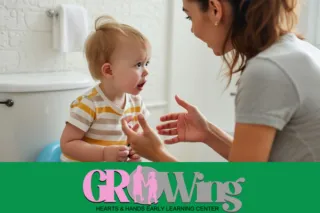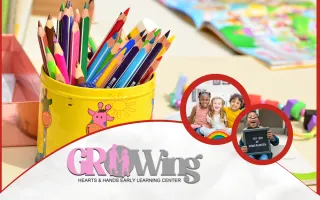
Best Daycare in Carrollton Georgia
Give us a call @ (678)601-3067
Growing Hearts and Hands
At Growing Hearts and Hands, we believe that every child deserves a nurturing environment where they can thrive academically, socially, and emotionally. Our state-of-the-art facilities and dedicated educators are committed to providing personalized learning experiences tailored to each child's unique needs.

Why Choose Growing Heart and Hands?
Customized Learning Plans:
We develop individualized learning plans that cater to your child's specific learning style and pace, ensuring optimal growth and development.

Qualified and Caring Educators:
Our team comprises certified professionals trained in early childhood education, CPR, and first aid, dedicated to fostering a safe and supportive learning environment.

Safe and Engaging Environment:
Our secure facilities are equipped with interactive play areas that encourage exploration and creativity, promoting holistic development.

Give us a call @ (678)601-3067
Schedule a Tour Today
Experience firsthand the vibrant learning community at Growing Hearts and Hands. We invite you to schedule a tour and discover how we can partner with you in your child's educational journey.


Learning for your Pre-Schooler
Three-year-olds are able to solve more and more problems, figure out unique ways to do something, and want to find out why – a lot! Learning Beyond helps you become a strong model, allowing children time to try and work through challenges while you ask important questions or provide support to children’s learning. Children’s skills in all developmental areas grow with these continued opportunities to be actively engaged in their learning and trusted as a learner. Learning Beyond provides quarterly benchmarks to help you stay focused on age-appropriate growth and excited learners.
Give us a call @ (678)601-3067

The Ultimate Guide to Preparing Your Child for Preschool
The Ultimate Guide to Preparing Your Child for Preschool
Preschool is a major milestone in a child's life, and it can bring a mix of emotions for both parents and children. While it’s an exciting time filled with new experiences, friendships, and learning opportunities, it can also be a source of anxiety. The good news? A little preparation goes a long way in making the transition to preschool smooth and enjoyable for everyone.
In this guide, we’ll cover everything you need to know to get your child ready for preschool, from building independence to fostering social skills, easing separation anxiety, and even preparing yourself as a parent.

Why Preschool Preparation Matters
Starting preschool is more than just attending a new place—it’s a big change in routine, environment, and expectations. A well-prepared child will adjust more easily, feel more confident, and have a more positive experience. The goal is to help them feel secure, capable, and excited about this new adventure.
1. Build Independence Through Everyday Tasks
Preschoolers thrive when they can do things on their own. Encouraging independence before preschool starts helps build their confidence and makes daily transitions smoother. Here’s how you can encourage self-sufficiency:
Encourage Self-Help Skills
Let them practice putting on and taking off their shoes.
Teach them to wash their hands properly.
Show them how to unzip and zip their coat.
Encourage them to use the potty independently (if required by the preschool).
Have them clean up their toys after playtime.
Letting children handle these simple tasks on their own will make them feel capable and ready to navigate preschool life more independently.
2. Foster Social Skills Through Interaction
Preschool is often a child’s first structured social experience outside the home. Giving them opportunities to interact with other kids before their first day can make a huge difference.
Ways to Build Social Skills:
Organize Playdates: Arrange time with other kids to practice sharing and taking turns.
Take Them to Public Play Areas: Parks, libraries, and indoor play centers provide great opportunities for interaction.
Practice Turn-Taking Games: Simple board games, puzzles, or role-playing activities help kids learn patience and cooperation.
Teach Conflict Resolution: Help them use words to express emotions instead of resorting to frustration or tantrums.
These experiences teach children how to work through social situations and make friends with greater ease.
3. Create a Consistent Routine
Preschool operates on a structured schedule, so helping your child get accustomed to a routine before the first day will ease the transition.
How to Build a Routine:
Establish a morning routine with waking up, eating breakfast, and getting dressed at the same time each day.
Set a consistent bedtime to ensure they get enough rest.
Introduce structured play and learning sessions, such as storytime, arts and crafts, or sensory play.
Have a designated quiet time each day to help them practice sitting and focusing for short periods.
By aligning your home schedule with their upcoming preschool routine, they will adapt more quickly to their new school environment.
4. Talk About Preschool in a Positive Way
Children pick up on their parents’ emotions. If you talk about preschool with excitement and positivity, they will feel more confident about it.
Ways to Introduce Preschool:
Read Books About Preschool: Stories like Llama Llama Misses Mama or The Kissing Hand help kids relate to preschool experiences.
Role-Play Preschool Scenarios: Set up a pretend classroom at home where they can practice listening, taking turns, and following simple instructions.
Drive by the Preschool: Show them the building, the playground, and any familiar landmarks so it feels less intimidating.
Talk About What to Expect: Explain what will happen during the day, from morning drop-off to snack time and playtime.
Helping your child visualize preschool will make it feel more familiar and exciting rather than scary.
5. Address Separation Anxiety
It’s completely normal for children to feel anxious about being away from their parents for the first time. Preparing them for this transition can make saying goodbye much easier.
Tips for Easing Separation Anxiety:
Practice Short Separations: Leave them with a trusted family member or babysitter for short periods to help them get used to being apart.
Create a Goodbye Ritual: Develop a special hug, high-five, or phrase that you’ll say at drop-off each day.
Give Them a Comfort Object: A small toy, picture, or special bracelet can help them feel connected to you during the day.
Keep Goodbyes Short and Confident: Lingering or showing hesitation can make separation harder. A simple, cheerful goodbye reassures them that everything will be okay.
6. Develop Language and Communication Skills
Helping your child express their thoughts and emotions will make it easier for them to interact with teachers and classmates.
Ways to Boost Communication Skills:
Encourage Conversation: Ask open-ended questions like “What was your favorite part of today?”
Label Feelings: Teach words for emotions, such as happy, sad, frustrated, or excited.
Practice Following Instructions: Give simple directions like “Put your toy in the box” or “Wash your hands before lunch.”
The more comfortable they are communicating, the easier it will be for them to express their needs at preschool.
7. Let Them Be Bored
Modern kids are often overstimulated with screens and structured activities. Learning to handle boredom encourages creativity and problem-solving skills.
Why Boredom is Beneficial:
Encourages imagination and creativity.
Helps children become independent problem-solvers.
Prepares them for unstructured playtime at preschool.
Next time your child says, “I’m bored,” resist the urge to hand them a screen or entertain them. Instead, encourage them to find something to do on their own.
8. Prepare Yourself as a Parent
Let’s be honest—sending your child to preschool can be just as emotional for parents as it is for kids. It’s completely normal to feel nervous or even a little sad.
Tips for Parents:
Trust the Process: Know that preschool is a valuable step in their development.
Connect with the Teachers: Build a relationship with their teachers to feel reassured about their well-being.
Find a Support System: Talk to other parents who have been through it and share your feelings.
Celebrate the Milestone: Take pictures, plan a small celebration, and acknowledge the achievement!

Final Thoughts
Preschool is an exciting new adventure, and with a little preparation, your child will be ready to thrive. By building independence, fostering social skills, setting routines, and easing separation anxiety, you’re setting them up for success.
Every child adjusts at their own pace, so be patient and offer encouragement along the way. Before you know it, they’ll be running into class with confidence and excitement.
Are you getting ready for preschool? Share your experiences or tips in the comments below!